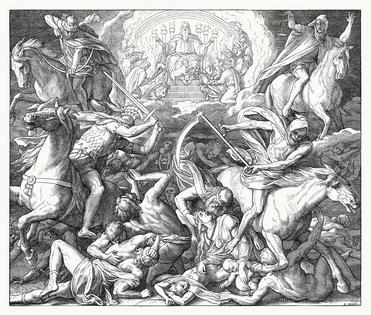How ‘apocalypse’ became a secular as well as religious idea
Published in News & Features
The exponential growth of artificial intelligence over the past year has sparked discussions about whether the era of human domination of our planet is drawing to a close. The most dire predictions claim that the machines will take over within five to 10 years.
Fears of AI are not the only things driving public concern about the end of the world. Climate change and pandemic diseases are also well-known threats. Reporting on these challenges and dubbing them a potential “apocalypse” has become common in the media – so common, in fact, that it might go unnoticed, or may simply be written off as hyperbole.
Is the use of the word “apocalypse” in the media significant? Our common interest in how the American public understands apocalyptic threats brought us together to answer this question. One of us is a scholar of the apocalypse in the ancient world, and the other studies press coverage of contemporary concerns.
By tracing what events the media describe as “apocalyptic,” we can gain insight into our changing fears about potential catastrophes. We have found that discussions of the apocalypse unite the ancient and modern, the religious and secular, and the revelatory and the rational. They show how a term with roots in classical Greece and early Christianity helps us articulate our deepest anxieties today.
Humans have been fascinated by the demise of the world since ancient times. However, the word apocalypse was not intended to convey this preoccupation. In Greek, the verb “apokalyptein” originally meant simply to uncover, or to reveal.
In his dialogue “Protagoras,” Plato used this term to describe how a doctor may ask a patient to uncover his body for a medical exam. He also used it metaphorically when he asked an interlocutor to reveal his thoughts.
New Testament authors used the noun “apokalypsis” to refer to the “revelation” of God’s divine plan for the world. In the original Koine Greek version, “apokalypsis” is the first word of the Book of Revelation, which describes not only the impending arrival of a painful inferno for sinners, but also a second coming of Christ that will bring eternal salvation for the faithful.
Many American Christians today feel that the day of God’s judgment is just around the corner. In a December 2022 Pew Research Center Survey, 39% of those polled believed they were “living in the end times,” while 10% said that Jesus will “definitely” or “probably” return in their lifetime.
Yet for some believers, the Christian apocalypse is not viewed entirely negatively. Rather, it is a moment that will elevate the righteous and cleanse the world of sinners.
Secular understandings of the word, by contrast, rarely include this redeeming element. An apocalypse is more commonly understood as a cataclysmic, catastrophic event that will irreparably alter our world for the worse. It is something to avoid, not something to await.
...continued











Comments